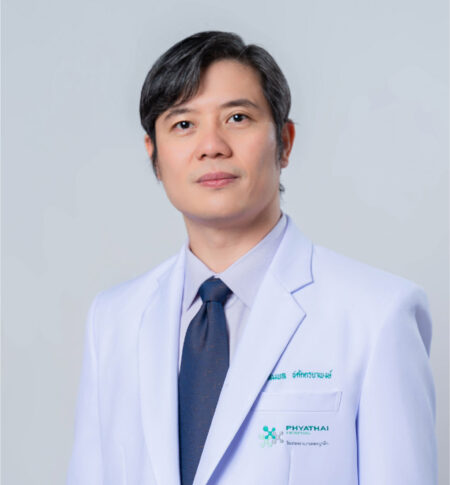
Dr. Sippanont Samchai
After Dr. Sippanont Samchai successfully graduated with a Doctor of Medicine degree from Thammasat University in the year 2543 B.E., he became a practicing physician and received funding for further studies. He then pursued a specialization in Neurology at Phramongkutklao Hospital before becoming a neurologist at Phaya Thai Sri Racha Hospital. Later, he continued his studies in the fields of Epilepsy and Sleep Medicine. Currently, he is an expert neurologist, specializing in epilepsy and sleep medicine. Dr. Sippanont shared the motivation behind his studies and work, saying:
“I chose to further study in the fields of sleep medicine and epilepsy because I noticed that patients with neurological problems need specialized care, and there are relatively few doctors who specialize in these areas. However, the number of patients keeps increasing. I became interested and wanted to help these patients, including those suffering from epilepsy, sleep disorders, Parkinson’s disease, dementia, headaches, and stroke, as they are all conditions related to the nervous system and the brain.”
Epilepsy requires understanding and time for treatment. It can arise from various causes, starting from birth abnormalities to certain medical conditions such as cerebral infarction, cerebral hemorrhage, brain tumors, and head injuries, as well as side effects from other factors like alcohol consumption, drug abuse, and various nerve stimulants.
Most of Dr. Sippanont ‘s patients come to him during emergencies or for regular follow-ups, as epilepsy is often a chronic condition that requires continuous medication to manage symptoms.
“Indeed, many epilepsy patients believe that their condition is incurable, which leads some of them to lose hope and neglect medical advice. However, as a doctor, I explain to my patients that there is always hope in every treatment. This instills them with courage to fight and be ready to follow the correct treatment procedures. Treating this condition involves periodic assessments to adjust the medication according to the symptoms. Although epilepsy may not be completely curable, it can significantly improve the patient’s quality of life and enable them to live a normal life.”
Diagnosis and Treatment of Sleep Problems
Sleep-related disorders are not uncommon, especially among individuals who are overweight, obese, or have underlying health conditions such as high blood pressure or diabetes. If you often feel fatigued during the day, experience dizziness, headaches, or have pre-existing medical conditions that are not responding well to treatment, it is essential to consult a doctor. This is to discuss any potential indications for further examination and to determine the appropriate course of action to improve these conditions and prevent any adverse effects on other health issues. If left untreated, there is a higher risk of developing severe sleep apnea during sleep.
“Sleep-related disorders are usually observed in people while they are asleep. Symptoms like sleepwalking, intense body movements, restlessness, tossing and turning, or pauses in breathing during sleep should be monitored closely. Patients should also pay attention to any abnormal bodily signals, such as frequent morning headaches, feeling unrefreshed during the day, or waking up startled frequently during the night. If you experience any of these symptoms, it is crucial to consult a doctor for a detailed examination.”
The field of sleep medicine is quite extensive, and Dr. Sippanont encounters and treats various sleep-related conditions such as sleep apnea and sleep disorders. The initial treatment may involve discussions, assessments, and sleep tests, followed by advice on lifestyle changes and the use of breathing assistance devices during sleep. Additional examinations may also be necessary. For patients with sleep seizures, abnormal movements during sleep, or REM sleep behavior disorder, treatment mainly involves providing advice and using medication as a primary approach.
As a neurology specialist, the doctor emphasizes the importance of continuous care for patients with neurological disorders, as these conditions often require long-term management. Physicians must have empathy and prioritize the well-being of patients. They should monitor treatment results consistently and stay updated on research, integrating new knowledge and medical innovations to enhance diagnostic and treatment effectiveness.
“Diseases related to the nervous system often require significant reliance on technology. At Phyathai Sriracha Hospital, we possess comprehensive medical tools, starting from diagnostic examinations to the use of advanced brain imaging technologies such as CT scans and MRI scans. For conditions like epilepsy, we conduct brainwave examinations. In the field of sleep medicine, we utilize sleep monitoring devices to observe brainwave patterns, heart rate, and breathing rate, enabling accurate diagnoses.
Currently, most people are familiar with and aware of the dangers associated with cerebral infarction, stroke, transient ischemic attacks (TIA), and epilepsy. However, many may not be fully aware that sleep-related disorders can also have a profound impact on one’s health. Therefore, if you or someone you know experiences symptoms mentioned above









